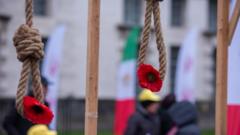The United Nations (UN) has disclosed that Iran executed at least 901 individuals in 2024, representing the highest figure seen in nine years. This ominous statistic reflects a 6% rise compared to 2023 when 853 executions were recorded. Volker Türk, the UN human rights chief, expressed deep concern over this trend, stating, "It is high time Iran stemmed this ever-swelling tide of executions."
In the past year, a significant portion of executions was attributed to drug-related offenses, with a worrying acknowledgment that dissidents and individuals connected to the protests from 2022 were also sentenced to death. Alarmingly, reports indicate a surge in the number of women executed in Iran. According to Norway-based Iran Human Rights (IHR), 31 women were put to death last year, the highest since monitoring began 17 years ago.
Of these women, 19 were convicted of murder and notable cases emerged, such as that of Leila Ghaemi, who killed her husband after he and his associates assaulted her daughter. The remaining 12 women faced execution for drug-related offenses, with one case highlighting a woman, Parvin Mousavi, who was executed for allegedly transporting morphine under false pretenses.
Activists assert that Iran's application of the death penalty for drug offenses contravenes international legal standards that stipulate this punishment should only be reserved for the "most serious crimes." Reports from human rights groups indicate that ethnic and religious minorities suffer disproportionately from executions. For instance, the Kurdish group Hengaw revealed that over half of those executed were from Iran's ethnic minorities, with 183 Kurdish individuals among them, exacerbated by a government crackdown that followed the "Woman, Life, Freedom" protests.
Additionally, HRANA documented five juvenile offenders who were executed, a violation of international law that prohibits capital punishment for those under 18 at the time of their alleged offenses. As noted by Amnesty International, Iran accounted for an astounding 74% of recorded executions worldwide in 2023, not including China, where thousands are believed to be executed annually but where data on such cases remains classified.
In light of these developments, Türk has urged Iranian authorities to halt all further executions, advocating for a moratorium on the death penalty with the goal of eventual abolition, emphasizing that such practices are fundamentally incompatible with the right to life.






















